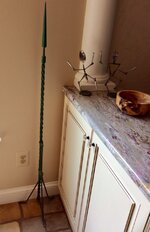I can really relate to Frank's concern. My mother came from a very large family, and when I was a kid growing up in Florida, our family, and her brothers and sisters and their families, all rented vacation cottages on Lake Worth so that we could have a week together each summer. My dad loved to fish, and would go out before dawn every day. The day came when he and my aunt's father were out fishing when a thunderstorm came up. Fortunately, they were smart enough to head for shore, store the boat, and then hitchhike back to the cottage. But the family was in a panic at the though of those two guys out in a boat during a thunderstorm on Lake Worth.
To John's point, the lightning rods (aka 'earth terminals') are the pointy things you frequently see on the roof of barns or other high structures. The idea is that by being the highest point, and with a robust electrical connection to earth, they provide a path for lightning discharge current to flow to earth without causing harm.
The surge protectors we commonly use on computers and TVs are semiconductor devices (typically zinc oxide) that suppress voltage surges coming in from an external source. The best analogy is an infinity edge swimming pool - ripples can propagate across the surface of the water, but when they reach the edge, they simply disappear over the side. The actual semiconductor is contained in a small blob of plastic inside the outlet strip. And John is correct - they have a very finite thermal withstand capability (rated in joules), and if that capability is exceeded, the device can fail. And when they fail, there often nothing to indicate that the failure has occurred, and therefore the device is no longer providing protection.
A whole-house arrester is a very good idea, especially if your house is served via an overhead wires. The best location is to have it installed at the point where the overhead wires attach to the side of the house, and connect to the cable that enters the house, but it is also common to see them at the electrical panel (fuse box).
There has been a lot of research done on lightning, but it remains an area of great mystery. The prevailing understanding is that lightning comes about when the electrical charge gradient between earth and cloud exceeds the withstand capability of air. There are those who believe that earth terminals can be designed in a way that minimizes the buildup of that charge gradient. Some people who have used the technology believe that they have seen a reduction in the frequency of lightning strikes. Many other believe that the efficacy of that technology has never been conclusively demonstrated, and therefore it's just a form of snake oil.

